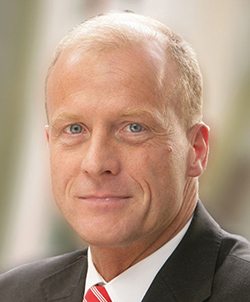The U.S. has a defense budget of roughly $600 billion. In the EU, it’s around €190 billion ($264 billion) for a region with a higher gross domestic product. Overall, I would say European defense is in an appalling state. There have been a lot of declarations and initiatives since the end of the Cold War, but very little tangible, substantial action on the ground. Between 2001 and 2010, European defense budgets declined by €25 billion. Even the two leading military nations, the U.K. and France, are unable to manage limited military operations—I’m talking about the Libyan conflict of 2011—without massive U.S. support.
 | Tom Enders is the CEO of the Airbus Group. This was adapted from a speech he recently gave to the Atlantic Council in Washington. Airbus File Photo |
Europe has 17 production lines for tanks, armored vehicles and artillery, compared to two in the U.S. There are 16 different naval frigates in Europe versus a single class in the U.S., 89 active weapons programs in the EU versus 27 in the U.S. Those are 2009 numbers, but it is not any better now. By one account, 20% of all development costs in Europe are just for certification, because we have national certification. We have seen some consolidation in the industry in areas such as space, missiles and electronics. But there has been almost none in military aircraft, ships or ground systems. The reasons are quite clear: too many national interests, too much overlap and too much waste.
Then-U.S. Defense Secretary Robert Gates, in his farewell address in Brussels in 2011, pointed out that the U.S. share of NATO defense spending had risen to 75%, up from roughly 50% in the Cold War years. He noted that due to the European shortcomings, NATO faced the “very real possibility of collective military irrelevance.” In his words, if current trends in the decline of European defense capabilities are not halted or reversed, future U.S. political leaders may not consider the return on America’s investment in NATO worth the cost. Very blunt words, but from a departing defense secretary. Maybe these messages would make more of an impression on European governments if they were part of an inauguration address, or something like that. Perhaps the events in Ukraine will be more effective; some Eastern European countries have voted to increase their defense spending.
The European defense malaise, if I may say so in my undiplomatic style, has serious consequences for the industry. R&D budgets are significantly smaller. Most investment is still spent on national programs. There is a pretty obvious lack of economy of scale. If the U.S. orders 179 tankers in the first batch, Britain will order 14. Even the big multinational programs are conducted very inefficiently. National requirements, national certification and national procurement rules prevent scarce budgets from being spent wisely and efficiently. These practices certainly do not result in what the Americans call a healthy industrial base. By the way, I have never heard someone in Europe speak about a healthy industrial base, because that means an industry should be allowed to make decent profits and should be incentivized—a rather difficult notion in Europe.
I could not agree more with Linda Hudson [the former CEO] of BAE Systems North America when she said that as an industry we must get much better at recruiting and retaining talent. She said we must be more inclusive, attractive and inspirational. If Linda thinks it’s bad over here, it’s much worse in Europe. In quite a few countries, certainly including mine [Germany], many see defense as kind of a dirty industry. That makes it very difficult to attract and retain talent.
I don’t want to conclude this European chat on too gloomy a note. Not everything is dark and hopeless. For the first time in five or six years, the European Council held a defense summit last September. They discussed concrete projects and have already scheduled a follow-up meeting. In another initiative, nine EU countries plus Norway signed a letter of intent to pool their acquisition for tanker aircraft. But still, we are far, far away from an effective European defense strategy.
We are reminded these days that military power continues to play a role in international relations, like it or not. Diplomacy, soft power, speaking softly can achieve only so much if they are not backed up by credible military options. The aerospace industry stands ready to contribute to our nations’ security— I hope more effectively, and more efficiently.
Source